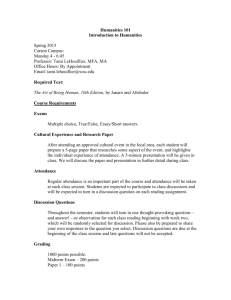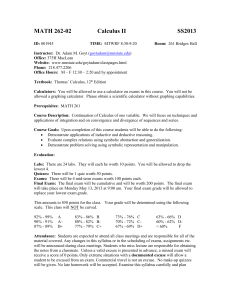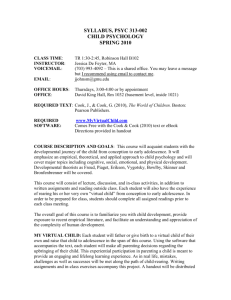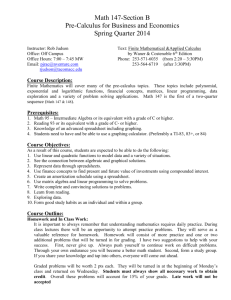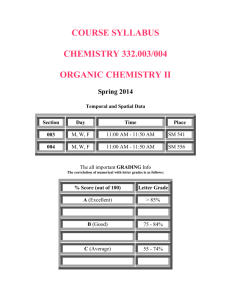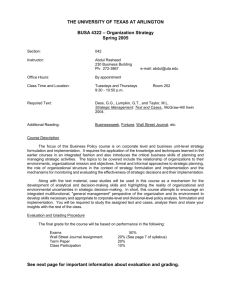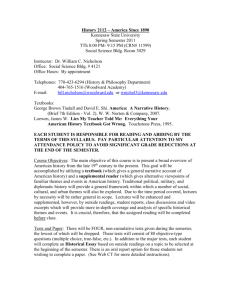Kennesaw State University History 2112/03: America Since 1890
advertisement
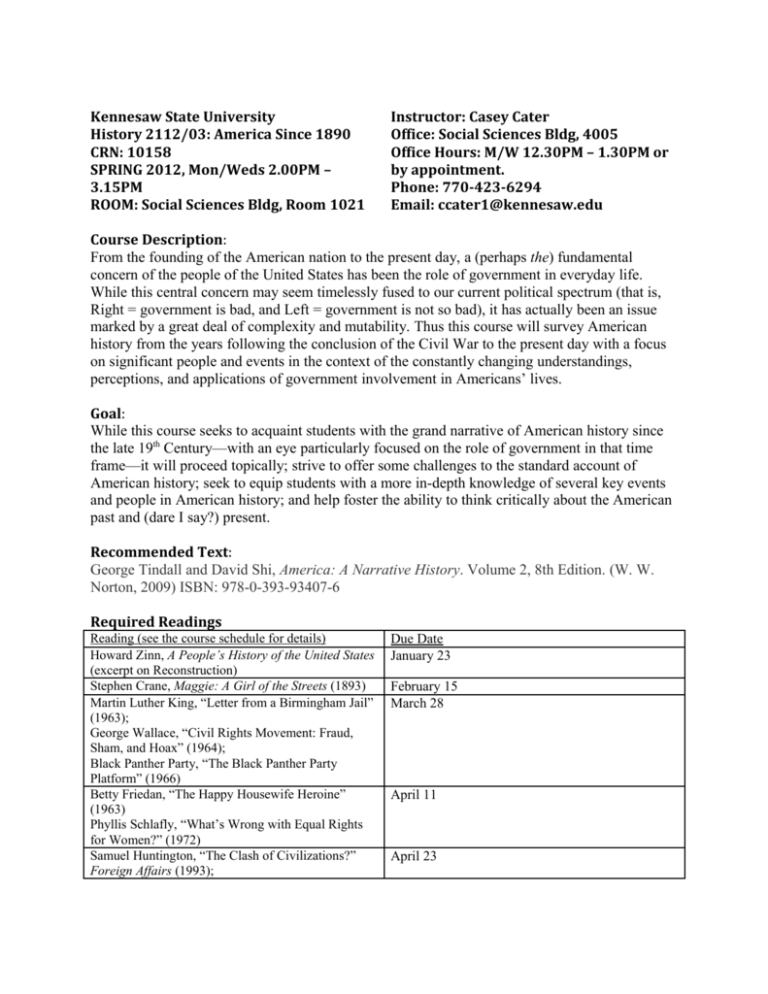
Kennesaw State University History 2112/03: America Since 1890 CRN: 10158 SPRING 2012, Mon/Weds 2.00PM – 3.15PM ROOM: Social Sciences Bldg, Room 1021 Instructor: Casey Cater Office: Social Sciences Bldg, 4005 Office Hours: M/W 12.30PM – 1.30PM or by appointment. Phone: 770-423-6294 Email: ccater1@kennesaw.edu Course Description: From the founding of the American nation to the present day, a (perhaps the) fundamental concern of the people of the United States has been the role of government in everyday life. While this central concern may seem timelessly fused to our current political spectrum (that is, Right = government is bad, and Left = government is not so bad), it has actually been an issue marked by a great deal of complexity and mutability. Thus this course will survey American history from the years following the conclusion of the Civil War to the present day with a focus on significant people and events in the context of the constantly changing understandings, perceptions, and applications of government involvement in Americans’ lives. Goal: While this course seeks to acquaint students with the grand narrative of American history since the late 19th Century—with an eye particularly focused on the role of government in that time frame—it will proceed topically; strive to offer some challenges to the standard account of American history; seek to equip students with a more in-depth knowledge of several key events and people in American history; and help foster the ability to think critically about the American past and (dare I say?) present. Recommended Text: George Tindall and David Shi, America: A Narrative History. Volume 2, 8th Edition. (W. W. Norton, 2009) ISBN: 978-0-393-93407-6 Required Readings Reading (see the course schedule for details) Howard Zinn, A People’s History of the United States (excerpt on Reconstruction) Stephen Crane, Maggie: A Girl of the Streets (1893) Martin Luther King, “Letter from a Birmingham Jail” (1963); George Wallace, “Civil Rights Movement: Fraud, Sham, and Hoax” (1964); Black Panther Party, “The Black Panther Party Platform” (1966) Betty Friedan, “The Happy Housewife Heroine” (1963) Phyllis Schlafly, “What’s Wrong with Equal Rights for Women?” (1972) Samuel Huntington, “The Clash of Civilizations?” Foreign Affairs (1993); Due Date January 23 February 15 March 28 April 11 April 23 2 Eric Foner, “Rethinking American History in a Post9/11 World,” History News Network (2004) Course Policies In-class Policy: The short version: Respect your classmates and your instructor. Your classmates and I will show you the same respect. The long version: Any use of cellular phones, PDAs, iPods, MP3 players and/or any/all other electronic communication/entertainment devices in class is strictly prohibited. When class begins, your cell phone, iPod (and buds), etc needs to be put away (placed on your desk, or in your lap, does not qualify as put away). Moreover, cellular phones, PDAs, etc, are not to ring or beep, etc. in class—that means you will need to switch your phone to silent mode or even (Gasp!!) turn it off. During exams I will be even stricter where phones are concerned. The mere sight of your phone, iPod, etc. during an exam is evidence of cheating. If I see your phone during an exam I will immediately collect your test and assign you a grade of zero for that exam. This is not just my policy; it is Kennesaw State University’s policy too. Check it out. Laptop use in class is permitted, though I reserve the right to revoke laptop privileges for any/all of you at any time for any reason. But let me caution you to use your laptop judiciously. Exams in this course derive almost solely from in-class material so you will need to come to class prepared to take notes--not to update your facespace status, read up on celebrity “news,” play solitaire, etc. Excessive side-conversations, passing notes, reading the newspaper, etc. are things that distract you, your classmates and me. The above listed, and any other, disruptions of class could result in a reduction of your final grade and, if serious enough, could result in removal from the class and/or withdrawal from the course. Make-Ups/Late Work: If you miss an exam you may make it up on the pre-scheduled make-up day: Monday, April 30 during regularly scheduled class time. Because you will have had more time to prepare, make-up exams will consist of several essay questions that will be evaluated according to a rigid standard. If you are not able to attend class on reading response days (RRD), you may submit a reading response by the next class meeting for half-credit. Reading responses that are submitted more than one class meeting after the RRD will receive no credit. Attendance/Participation: Attendance and participation in class are expected and strongly encouraged. After missing 3 classes, your final grade will fall by 5 points for each missed class. Disruptions of class could also adversely affect your final grade and, if serious enough, could result in your withdrawal from the course. Please note that I make no distinction between “excused” and “unexcused” absences. A bit more on attendance/participation: Attendance is a crucial component of your success in this course, and in college in general. Note-taking, which can really only be done in class, is an important skill—all the more important since 1) exams will derive almost solely from in-class materials (i.e. not from a text book), and 2) I will not post lecture outlines/notes or power point presentations in any format, in any location, for any reason. Please do not email me asking for lecture notes or power point slides; I will not respond. You should, however, get to know a This syllabus provides a general plan for the course; deviations may be necessary. 3 classmate or two so you can get lecture notes, etc. if you miss class. Beyond just lectures though, we will from time to time discuss readings and other materials, so your active participation in class is central to your success as well. Communication: Please check your GA View account regularly as I will post important messages about and documents pertinent to the course there frequently; I will also post your grades on GA View. If you want to contact me, the quickest way to get in touch with me is via email (ccater1@kennesaw.edu), though I do check my GA View account from time to time. Students with Disabilities: If you have a disability that requires accommodation, please notify me as soon as possible and provide the necessary documentation from DisAbled Student Support Services. Questions or concerns? Contact: Carol Pope, Assistant Director; Student Center, Suite 267; 770-423-6443; cpope@kennesaw.edu Academic Honesty: Read the section on academic honesty in the student handbook found here: https://web.kennesaw.edu/academicaffairs/studentrights#academic_honesty. But here’s the section on plagiarism and cheating: “No student shall receive, attempt to receive, knowingly give or attempt to give unauthorized assistance in the preparation of any work required to be submitted for credit (including examinations, laboratory reports, essays, themes, term papers, etc.). Unless specifically authorized, the presence and/or use of electronic devices during an examination, quiz, or other class assignment is considered cheating. Engaging in any behavior which a professor prohibits as academic misconduct in the syllabus or in class discussion is cheating. When direct quotations are used, they should be indicated, and when the ideas, theories, data, figures, graphs, programs, electronic based information or illustrations of someone other than the student are incorporated into a paper or used in a project, they should be duly acknowledged. No student may submit the same, or substantially the same, paper or other assignment for credit in more than one class without the prior permission of the current professor(s).” Academic Integrity Statement: Every KSU student is responsible for upholding the provisions of the Statement of Student Rights and Responsibilities, as published in the Undergraduate and Graduate Catalogs. Section II of the Statement of Student Rights and Responsibilities addresses the University’s policy on academic honesty, including provisions regarding plagiarism and cheating, unauthorized access to University materials, misrepresentation/falsification of University records or academic work, malicious removal, retention, or destruction of library materials, malicious/intentional misuse of computer facilities and/or services, and misuse of student identification cards. Incidents of alleged academic misconduct will be handled through the established procedures of the University Judiciary Program which includes either an “informal” resolution by a faculty member, resulting in a grade adjustment, or a formal hearing procedure, which may subject a student to the Code of Conduct’s minimum one semester suspension requirement. This syllabus provides a general plan for the course; deviations may be necessary. 4 Questions or concerns: Please contact me at any time (email is the best way to do so, but please give me 48 hours to respond) with any questions or concerns you may have. You can of course drop by the office if you prefer a face-to-face meeting, although I would strongly encourage you to make an appointment if you want to meet. If you’d like, we can even talk over the telephone. In any case, if you are having problems with the course and/or are experiencing personal problems that are affecting your ability to perform well in the course, please let me know as soon as you possibly can. Don’t wait until the day of the Final Exam or until you see your final grade to make me aware of any difficulties you’re having or that you’re in jeopardy of losing your HOPE scholarship, or that you think you “deserve” a grade bump because you’ve worked so hard, etc. By then it’s almost certainly too late. It is much easier to prevent a bad grade than to repair a bad grade after the fact. Tips: Above all, try to stay focused and relaxed. You may find the work load (lectures, note taking, readings, exams, and reading responses) challenging, but hang in there, work hard, and you’ll be fine. Take careful notes and budget some time to review them after class. Give yourself plenty of time to do the required readings (and to re-read if necessary) and to study for the exams. You will find that it is a good idea to form a study group. It is wise to retrieve and keep copies of tests and reading responses until you’ve received your final grade, and it is also wise to keep track of your grades as the semester progresses. If your grades do not appear on your GAView page after I’ve returned tests, etc, you should let me know so that we can make sure you get credit. Course Requirements and Grading Course Requirements: The requirements for this course will be met through 4 exams, based on lectures, other in-class materials, and readings; and through 5 reading responses based on assigned readings. Instructions for Completing Course Requirements: • Exams will be closed-book, closed-note and will consist of a variety of objective items (multiple choice, true/false, etc) derived primarily from in-class material (lectures, films, etc). A small portion of each exam will cover assigned readings. Please note that although some of the material in the recommended/optional text book overlaps with what we will cover in class, I do not lecture from the textbook. If you think you can get a copy of the optional text book, read it, and pass the tests and the course, you are wrong. • Reading Responses will ask you several questions (5-10) that will evaluate whether you have read and engaged the assigned reading. The responses will be completed in class on “reading response days” (RRD) but, let me reiterate, you must read the assigned works before you come to class. This syllabus provides a general plan for the course; deviations may be necessary. 5 Grading for the Course: Components/weights Exam 1 = 10% Exam 2 = 15% Exam 3 = 25% Final Exam = 30% Reading Responses = 20% Grading Scale A= 90 – 100 B= 80 – 89 C= 70 – 79 D= 60 – 69 F= Below 60 Course Schedule Important Dates: January 9: First Day of Class January 7-13: Drop/Add March 12: Last day to withdraw w/o penalty April 30: Last Day of Classes April 30: Make-Up Day May 2: Final Exam (1.00PM - 3.00PM) WEEK 1 • M Jan 9: Course Introductions • W Jan 12: LECTURE: The Reconstruction Amendments WEEK 2 • M Jan 16: MLK Holiday—NO CLASSES!! • W Jan 18: Reconstruction, Race, and The Birth of a Nation WEEK 3 • M Jan 23: RRD: Excerpt on Reconstruction from Howard Zinn, A People’s History of the United States: http://www.historyisaweapon.com/defcon1/zinnslaem10.htm l (start with paragraph that begins “The American government had set out to fight the slave states in 1861…”) • W Jan 25: LECTURE: The New South and Jim Crow WEEK 4 • M Jan 30: LECTURE: The New West and the Indian Wars • W Feb 1: EXAM 1 WEEK 5 • M Feb 6: LECTURE: The Populist Persuasion • W Feb 8: LECTURE: Progressivism: Prohibition WEEK 6 • M Feb 13: LECTURE: Progressivism: Social Hygiene • W Feb 15: RRD: Stephen Crane, Maggie: A Girl of the Streets (1893). Access on your GA View page or here: http://www.gutenberg.org/cache/epub/447/pg447.txt WEEK 7 • M Feb 20: LECTURE: WWI and the CPI • W Feb 22: LECTURE: The Roaring ‘20s Recommended Reading: None Recommended Reading: Tindall Chap. 18 Recommended Reading: Tindall Chap. 19 Recommended Reading: Tindall pp. 803-821 Recommended Reading: Tindall pp. 880-897 Recommended Reading: Tindall Chap. 24 Recommended Reading: Tindall Chap. 25 This syllabus provides a general plan for the course; deviations may be necessary. 6 WEEK 8 • M Feb 27: 1920s Culture and The Jazz Singer • W Feb 29: EXAM 2 March 3 – 9: SPRING BREAK NO CLASSES!!! WEEK 9 • M Mar 12: LECTURE: The New Deal and the TVA • W Mar 14: LECTURE: WWII and the Four Freedoms WEEK 10 • M Mar 19: LECTURE: Red Menace • W Mar 21: LECTURE: The Long Civil Rights Movement WEEK 11 • M Mar 26: LECTURE: The Classical Civil Rights Movement • W Mar 28: RRD: Martin Luther King, “Letter from a Birmingham Jail” (1963): http://history.hanover.edu/courses/excerpts/111mlk.html ; George Wallace, “Civil Rights Movement: Fraud, Sham, and Hoax” (1964): http://www.fordham.edu/Halsall/mod/1964WALLACE.asp ; Black Panther Party, “The Black Panther Party Platform” (1966): http://history.hanover.edu/courses/excerpts/111bppp.html WEEK 12 • M Apr 2: EXAM 3 • W Apr 4: LECTURE: The Great Society WEEK 13 • M Apr 9: LECTURE: The Equal Rights Movement • W Apr 11: RRD: Betty Friedan, “The Happy Housewife Heroine” (1963) http://www.hnet.org/~hst203/documents/friedan2.html ; Phyllis Schlafly, “What’s Wrong with Equal Rights for Women?” The Phyllis Schlafly Report (1972), available on your GAView page. WEEK 14 • M Apr 16: LECTURE: The Reagan Revolution, 1980-1994 • W Apr 18: First Blood and Foreign Policy in the 1980s WEEK 15 • M Apr 23: RRD: Samuel Huntington, “The Clash of Civilizations?” Foreign Affairs (1993); Eric Foner, “Rethinking American History in a Post-9/11 World,” History News Network (2004)—both are posted on your GAView page. • W Apr 25: LECTURE: The War on Terror FINALS WEEK • M Apr 30: Make-Up Day/Final Exam Study Day Recommended Reading: Tindall Chap. 26 Recommended Reading: Tindall Chap. 28 Recommended Reading: Tindall Chap. 32 Recommended Reading: Tindall Chap. 33 Recommended Reading: Tindall Chap. 34 Recommended Reading: Tindall Chap. 36 Recommended Reading: Tindall pp. 1422-1433 Recommended Reading: Tindall pp 1433-1473 This syllabus provides a general plan for the course; deviations may be necessary. 7 • W May 2: FINAL EXAM 1.00PM – 3.00PM This syllabus provides a general plan for the course; deviations may be necessary.


